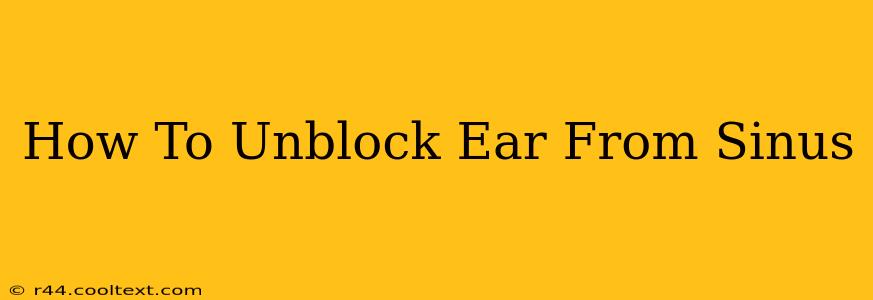Sinus pressure causing ear blockage is incredibly uncomfortable, leading to muffled hearing, pain, and overall discomfort. This frustrating issue is surprisingly common, often stemming from colds, allergies, or changes in altitude. Fortunately, there are several effective methods you can try at home to relieve this pressure and unblock your ear. This guide will walk you through safe and effective techniques to get relief quickly.
Understanding the Connection Between Sinuses and Ears
Before diving into solutions, it's crucial to understand the connection. Your sinuses and ears are interconnected through the Eustachian tubes. These tubes are tiny canals that equalize pressure between your middle ear and the atmosphere. When your sinuses become inflamed due to infection or allergies, this inflammation can affect the Eustachian tubes, leading to a blockage and the feeling of pressure in your ear.
Home Remedies to Unblock Your Ear
Several at-home remedies can provide relief from sinus-related ear blockage. Remember, these are suggestions, and if your symptoms worsen or persist, it's vital to seek medical attention.
1. Saline Nasal Spray or Rinse:
A saline nasal spray or rinse is often the first line of defense. The saline solution helps to clear nasal passages, reducing inflammation and allowing the Eustachian tubes to function properly. You can purchase saline sprays over the counter, or make your own using a neti pot and distilled water. Follow instructions carefully to avoid introducing bacteria into your nasal passages. This is a highly effective way to address the root cause—sinus congestion—that leads to ear blockage.
2. Steam Inhalation:
The moist heat from steam inhalation can help to loosen mucus and reduce inflammation in your sinuses. Simply boil some water, pour it into a bowl, and lean over it with a towel draped over your head to trap the steam. Inhale deeply for several minutes. Adding a few drops of eucalyptus or peppermint essential oil can enhance the effect. Caution: Be careful not to burn yourself.
3. Over-the-Counter Medications:
Decongestants (both oral and nasal sprays) can help shrink swollen nasal passages and improve Eustachian tube function. However, it's essential to use these medications as directed and not for prolonged periods, as overuse can lead to rebound congestion. Pain relievers, such as ibuprofen or acetaminophen, can help manage pain and discomfort associated with the ear blockage.
4. The Valsalva Maneuver:
This technique involves gently trying to equalize pressure in your ears. Pinch your nostrils closed, close your mouth, and gently blow your nose as if you're trying to force air out. You should feel a slight pop in your ear as the pressure equalizes. Perform this gently; forcing it can be harmful.
5. Hydration:
Staying well-hydrated is crucial for thinning mucus and aiding in its drainage. Drinking plenty of water, herbal teas, and clear broths can significantly contribute to relieving sinus pressure and ear blockage.
When to See a Doctor
While home remedies are often effective, you should seek medical attention if:
- Your symptoms persist for more than a few days.
- You experience severe pain or hearing loss.
- You have a fever or other signs of infection.
- You have a history of ear infections.
Ear blockage caused by sinus pressure is a common problem, but effective solutions exist. By implementing these home remedies and understanding when to seek professional help, you can effectively manage your symptoms and regain comfortable hearing. Remember, consistency with these techniques is key.

